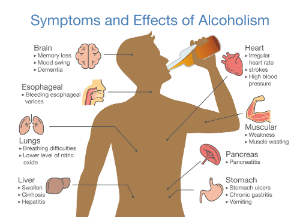Lots of adults use alcohol to decompress in one way or another.
Going to happy hour after work to blow off steam and complain about the boss. Some people kick up their feet and have a glass or two of wine after a hard day.
But, at what point does drinking go from a fun treat to dangerous self-medicating?
It can be hard to recognize, especially in yourself.
Are you wondering whether or not you’re an alcoholic? Finding out the symptoms and doing some self-reflection should be your next step.
There’s a lot more to alcoholism than drinking too much. Here’s how to identify the signs of alcoholic behavior and do something about it fast.
What Defines Alcoholism?
The clinical name for alcoholism is Alcohol Use Disorder (AUD). The National Institute on Alcohol Abuse and Alcoholism categorize AUD as a chronic, relapsing brain disease.
They go on to say that those suffering from AUD experience compulsive alcohol use. Drinkers lose control of their intake.
During periods when they are not drinking, they are put in a negative emotional state. They become agitated, depressed or anxious.
Simply being a heavy drinker does not necessarily make you an alcoholic. If this definition doesn’t sound like you, you could be a social drinker.
Social Drinkers
A social drinker is someone who exhibits low-risk drinking habits.
For women, that means drinking no more than 7 drinks per week. In one sitting, a social drinker won’t exceed 3 drinks.
Low-risk drinking for men allows for up to 14 drinks per week. No more than 4 drinks per sitting are considered normal.
You can still be considered a social drinker and occasionally exceed the limit. For example, the holidays might be a time when one might drink more than usual.
Most adult drinkers have “a little extra fun” from time to time. It’s whether that behavior becomes the norm and not the exception. If it does, that might constitute “problem drinking.”
Problem Drinkers
A problem drinker consumes more than the social drinker. However, there is still a clear difference between them and an alcoholic.
Many adults go through a phase of their lives where they over drink. What sets them apart from alcoholics?
They eventually grow out of it.
A problem drinker might notice the negative effects of alcohol. After having one too many hangovers or blackouts, they learn to cut back.
If they don’t, that is probably a sign of alcoholic behavior.
Signs of Alcoholic Behaviour
 The list of signs of alcoholic behavior include:
The list of signs of alcoholic behavior include:
- Craving alcohol
- Feeling the need to cut down your drinking
- Failing at daily responsibilities due to drinking
- Relationships being affected by your drinking
- Spending a lot of time drinking and dealing with hangovers
- Prioritizing drinking over other activities
- Drinking and then engaging in risky behavior
- Developing a high tolerance for drinking
- Experiencing withdrawal symptoms
- Experiencing blackouts
- Drinking despite knowing it makes you depressed/anxious
People with AUD identify with two or more of those situations within one year.
You might be feeling like categorizing yourself as an alcoholic feels too harsh. That’s why AUD is actually considered to be on a spectrum of mild, moderate, and severe.
AUD: Mild, Moderate, and Severe
Not all alcoholics are the same. Some can maintain their responsibilities and don’t put themselves in dangerous situations.
Other alcoholics are more serious, ruining their lives and relationships.
What is the difference?
Mild
Mild AUD is categorized by being able to identify with 2 or 3 of the signs listed above.
At this point, it’s possible that you’re still in the phase of a “problem drinker.” You should still speak with a professional. This would be the best time to get control of your drinking before it escalates.
Moderate
If you experience 4 to 5 of the above symptoms, you would be classified as having moderate AUD.
In the mild and moderate categories, you might be what some say is a “high functioning alcoholic.” But, it can be a slippery slope between high to low functioning.
Severe
People with severe AUD can identify with 6 or more alcoholic behavior symptoms.
Professionals use this criterion to diagnose AUD. However, to make a formal diagnosis they look at each person on a case-by-case basis.
When getting help, a therapist takes the whole person into account. On paper, you might only have moderate AUD. But, a professional can look at all your patterns and decide your AUD is more severe.
That’s why if you fall anywhere on this spectrum you should consider getting treatment.
Treatment Available
There are several different treatment options available for people with AUD. Decide with a professional what’s right for you.
Outpatient Treatment
This kind of treatment allows you to continue with your daily responsibilities. It’s less in-depth therapy than you would experience in a traditional rehab center.
Outpatient treatment might include talk therapy sessions or 12-step meetings. This might be the right treatment for those with a more moderate level of AUD.
Inpatient Treatment
Residential rehab is often the next step for people who relapsed after out-patient treatment. Many people elect to go to rehab the first time they seek treatment.
For those who might experience withdrawal from alcohol, rehab is a good option. It’s best to detox while in the care of professionals.
After detoxing, you will likely go to regular one-on-one and group therapy sessions. The length of your stay could be a few weeks to a few months.
After inpatient treatment, you might transition to a sober living house. Many people maintain their sobriety by weekly outpatient treatment, like AA meetings.
Do You Need Help Controlling Your Drinking?
It’s tough to come to terms with the possibility that your drinking is out of control. One thing to remember is that you aren’t alone in this. There are many people who have gone through the same thing and came out the other side. To get help for you or a loved one contact our line at (877) 322-2450.


















